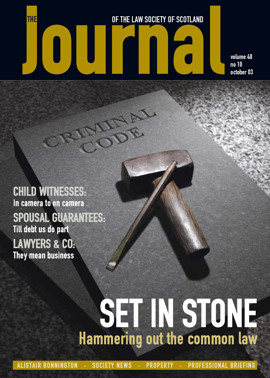Why politicians have got it wrong
“Don’t you just hate politicians?”, the late Kenny MacIntyre used to roar at the BBC Scotland newsroom on many a morning. I had no difficulty in agreeing with the Great Man. For 17 years I lectured in criminal justice in Glasgow and Strathclyde universities, and found that I had to re-write my lectures every summer, often because of meaningless political law-making – a process designed to chase votes rather than improve our overworked criminal courts.
The question of political interference in this area has become topical yet again with Jack McConnell’s speech in the Signet Library last month. In that speech, he made it clear that he sees lawyers in the firing line for what he claims are the system’s present ills. In particular, delays caused by accused persons having the temerity to plead not guilty and judges not sentencing certain types of offenders to jail for extraordinarily long periods of time are felt by our First Minister to be failings. On sentencing, his phrase “but our judges must also reflect the values of our society and the times in which we live” is an invitation to have Scottish judges sentence according to the philosophy of The Daily Record, The Daily Mail and The Sun.
Before we embark on this particular journey into darkness, perhaps we might pause to reflect how other civilised democracies deal with crime. I was privileged to address a criminal justice conference in London last year, organised by the FBI and the Metropolitan Police. Although well-attended, no-one from the Scottish Executive made it to the conference.
There was a high level of debate involving extremely experienced judges, prosecutors and police officers who had been involved in the sharp end of crime in some of the most dangerous cities in the world. We were addressed, for example, by the Commissioner of Police of Philadelphia, who used to work under Bill Bratton, the police officer who introduced the “zero tolerance” philosophy in New York. I was surprised to discover that it is not about brutal sentencing – nor is it a “prosecute-or-die” policy. It is, in fact, a community-based inter-agency policing system. Indeed, a hard-nosed prosecutor from the Bronx told us of the numerous alternatives he employed instead of taking people to court. When questioned by a UK delegate why he took this seemingly liberal approach, he told us that he knew it was the most successful system he could put in place. This was a man whose family had been attacked by drug dealers, who himself had regularly been assaulted, who forcefully told the questioner, “I sure as hell didn’t set out to fail”.
But what is common-sense for the Bronx does not apply, it would appear, in darkest Lanarkshire. According to our First Minister, many Scottish criminals are so recidivist that our judges must embrace the new intolerance of New Labour to deal with them. No quarter must be given – not because it will make the criminal less likely to re-offend – simply because it will make the newspapers, and the voters, happier.
But it would be churlish to say there is nothing of value in the First Minister’s speech. His idea of more inter-agency cooperation in the criminal justice system is perfectly reasonable and much needed. So too, although we lawyers are loth to admit it, some criminal practitioners are prone to drag out the length of court cases, either due to their inefficiency in preparation, or sadly in a few instances, due to the fact they want to maximise legal aid fees. Why the legal profession continues to pretend that this does not happen, I cannot understand. Everyone involved in the criminal courts knows the truth. Official denials make the profession look foolish. Many members of the public have direct experience of the courts. They see what goes on.
A much more honest dialogue has to take place. For that dialogue to happen, it will be necessary for the Scottish politicians to behave in a grown-up fashion when debating criminal justice, as opposed to grubbing in the gutter for soft votes. If Scotland is ever to progress from its culture of dependency (on England) and become a fully grown-up country, the politicians must create conditions for that process. Perhaps Mr McConnell could lead the way.
In this issue
- Why politicians have got it wrong
- The big idea
- A comment on the Draft Criminal Code
- Stories from the other side of the desk
- Employment practice liability
- Jurisdiction in insolvency proceedings
- Heard but not seen
- Inter-spouse guarantees: an update
- High value – high exposure?
- Internet arbitration clauses: shock and awe?
- Conflict of interest in commercial security transa
- Indecency no longer “shameless”
- Scottish Solicitors’ Discipline Tribunal
- Reforms to corporate insolvency law will give indi
- Rights on forestry access and limited partnerships
- Website reviews
- Book reviews
- Substitute certificates of title
- Housing Improvement Task Force
- Contaminated land: what to ask






